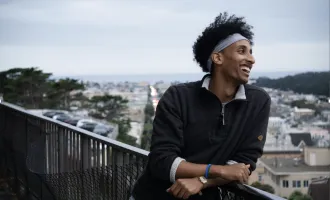
The Philippines' bronze medal at the 1954 World Championships is to this day the highest finish of any national basketball team outside of Europe and America.
A Balikbayan Box for My Ballers
Second place winner in the Synapse Storytelling Contest nonfiction category.
In the summer of 2020, I participated in Celestial Journeys, a writing workshop series hosted by a Filipino cultural arts center in San Francisco. One day, we opened up the discussion of grief and the importance of acknowledging it in our lives. As others shared their sorrows in Tagalog I struggled to understand.
Each word felt like a hand rinsing rice: stirring up and clouding the conversation around me with the dust of my broken Tagalog. How was it that even in this space, I still felt like an outsider?
When it was my turn to share, I mumbled, “I’m grieving my loss of Tagalog.” In that moment, I felt like I had let my ancestors down.
They had navigated our archipelago’s thousands of islands guided only by stars, yet I could no longer navigate the language after twenty-five years as a Filipino-American. Even now, I regret not speaking Tagalog more with my parents at home.
Without Tagalog as a tool, I’ve had to define my own common language that connects me to my Filipino heritage. Over the years, I found a large part of that cultural vocabulary through basketball.
The squeaks of sneakers on hardwood, staccato of dribbling, and my dad’s yelling at the pixelated referees onscreen are ingrained in my childhood memories. I was lucky enough to grow up in the Sacramento Kings’ era of Mike Bibby, Peja Stojakovic, Chris Webber, and Vlade Divac.
I still remember the stretch of my neck as I arced my head up to stare at Mike Bibby in line at the counter of a Kentucky Fried Chicken in Rancho Cordova a few towns over. The first curse words I learned in Tagalog were hurled towards the Lakers, with Kobe as the biggest target.
Whenever I was homesick in college, I would put on my dad’s Kings hat.
I thought that my family’s obsession with the NBA was another byproduct of American assimilation; I assumed that my dad began following the league during his visits to California for work before I was born.
It wasn’t until I went back for the first time at fourteen that I saw how a love of basketball had floated into my heart on currents tracing their way back to the Philippine Sea.
In Novaliches, where my dad’s childhood home had just been destroyed by a typhoon, a basketball hoop was mounted on any wall with a few square yards of ground to spare. On his own street, a small crowd of teenagers and opinionated Titas watched grade-school kids play in a game put on by the grassroots neighborhood league.
As the sun made its way west and those hoops’ shadows lengthened, their metal ring gaped wide open, like a Lola’s embrace. Or a Tito’s yawn during a post-merienda nap, as if to say “I’m still here. I can hold so much more.”
In the capital of a country whose heart beats in time with basketball’s twenty-four second shot clock, I began to recognize my love for this game as distinctly Filipino.
More recently, I discovered that in school, my dad and his friend installed a 40-ft radio antenna on the roof to watch games by tuning into channels accessible on the US military base. I can’t help but smile to myself whenever I think about this.
It reassures me that I am my father’s daughter: I occasionally use my VPN access credentials to catch livestreams of NBA games hosted on web servers in other countries with less restrictive intellectual property laws.
Last fall, my ongoing search for kinship through basketball led me down a rabbit-hole of existing academic literature on the cultural significance of basketball for Filipinos. This self-imposed research project left me feeling numb.
As ridiculous as it sounds, it felt like I was 13 again: frustrated at how no one seemed to understand. Seeing “well-meaning” academics chalk up my love for basketball to tribalism and the need for an underdog narrative just felt lazy.
Reflecting on that feeling of incompleteness, I now choose to center my own narrative of Filipinos’ love of basketball — the canon widely accepted within and across my many selves.
Our wholehearted embrace of basketball — an American-as-apple-pie sport introduced to the Philippines by YMCA priests — is a story of reclamation. Filipinos took this foreign game that was meant to Westernize them and bent the style of play to their physical advantages of agility, boundless lung capacity, and speed. The country’s bronze medal at the 1954 World Championships, to this day the highest finish of any national basketball team outside of Europe and America, served as a debut, much like the ones we throw for daughters upon turning eighteen. We introduced ourselves to the world and reveled in our newfound self-determination. That bronze medal, won by a homegrown team less than ten years after the Philippines gained independence from the United States, signified a new chapter in the Filipino people’s story finally written on our own terms.
“But maybe you should have read more and searched deeper; someone probably already came to the same conclusion in their PhD thesis.”
I wave away my own inner academic, the self that values nuanced hypotheses and proper citations. There’s game film of Saturday night’s Kings match-up against the Cavs that I want to study before the playoffs.



